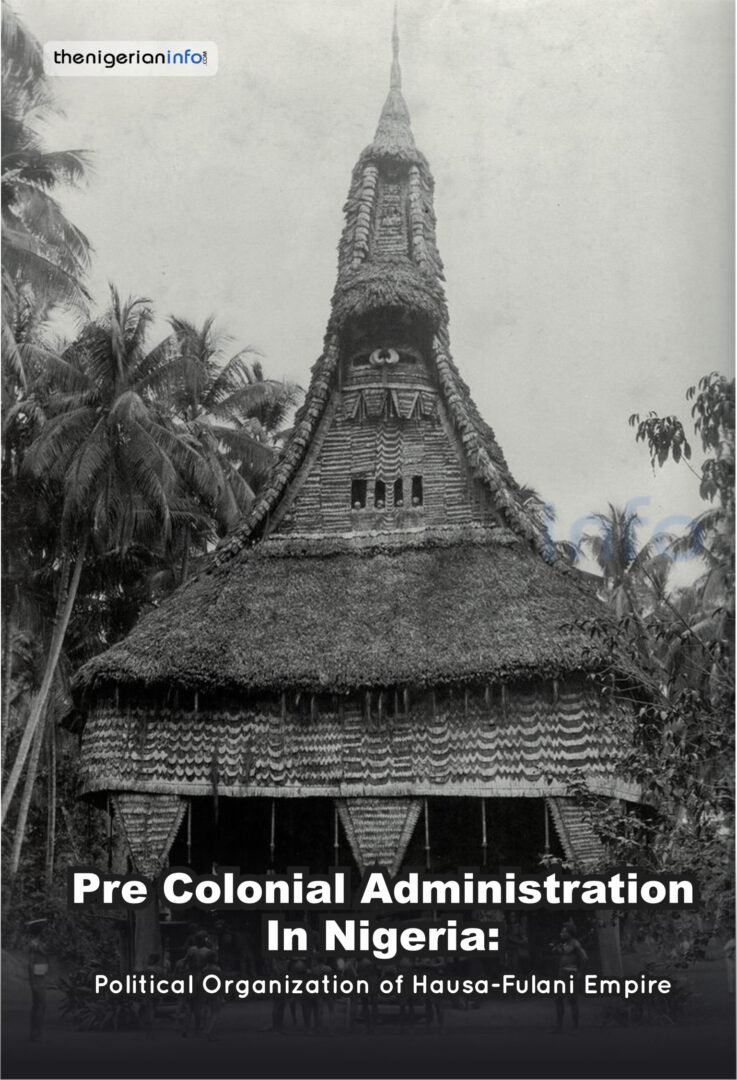The Hausa-Fulani Empire, also known as the Sokoto Caliphate, was a pre-colonial African state in what it is now in Nigeria. It was known for its complex political organization and was founded in the early 19th century by Usman Dan Fodio, and it was based on Islamic principles and governance. The Sokoto Caliphate was ruled by a supreme leader known as the Sultan or Caliph while Usman dan Fodio was the first Sultan and Caliph held both religious and political authority, and his rule was based on Islamic law (Sharia).


The empire was divided into many emirates, each ruled by an emir who had significant autonomy within his territory. Emirs were responsible for local administration and justice, and they collected taxes for the central government. They were subdivided into districts, and districts were divided into wards or villages where Local leaders, known as village or ward heads, were responsible for maintaining order and collecting taxes at the grassroots level. The empire relied on a taxation system known as “zakkat” or “zakat,” which was a form of Islamic almsgiving, and maintained a standing army, known as the “Fulani Jihad” warriors, which was used for defense and expansion.
Read also: Pre-colonial administration in Nigeria: political structure in Yoruba land
Political Organization of Hausa-Fulani Empire
The political organization of the Hausa-Fulani Empire, also known as the Sokoto Caliphate, is known as a hierarchy structure that blends Islamic principles with traditional governance.
Below is the political organization of the Hausa-Fulani Empire.
1. The Executive
The executive branch had authority over the legal system, which operated based on Islamic law (Sharia). Judges and legal administrators were responsible for resolving disputes, administering justice, and upholding the principles of Islamic jurisprudence.
Emirs and provincial leaders served as extensions of the executive branch, responsible for implementing the Caliph’s directives and policies at the regional and local levels. They had executive authority within their respective domains.
2. Administrative Structure
The administrative hierarchy was the Caliph or Sultan, who held both religious and political authority, he was considered the supreme leader and was responsible for guiding the empire according to Islamic principles and had the ultimate say in matters of governance and policy.
The empire was divided into emirates, These emirates were regions with governance structures where they acted as the rulers of their respective territories and were responsible for maintaining law and order, as well as collecting taxes. The Emirates was also subdivided into provinces, each headed by a provincial leader. Taxes were collected at various levels of administration to support the central government and provide for the welfare of the population.
3. The Legislature
The legislative structure within the political organization of the Hausa-Fulani Empire, or the Sokoto Caliphate, was based on a combination of Islamic principles and traditional administrative practices, While the focus of the empire’s governance was often on the religious and political authority of the Caliph. The Hausa-Fulani Empire had a consultative body known as the Shura Council.
The term “Shura” is derived from the Arabic word for “consultation,” reflecting the Islamic principle of seeking counsel in governance which consists of scholars, advisers, and respected figures from different regions of the empire. The Shura Council’s primary role was to advise the Caliph on matters of governance and policy related to the interpretation and application of Islamic law (Sharia) which was important for resolving legal issues and ensuring that the empire’s governance follows the Islamic principle.
4. Judiciary
The judiciary is a system that applies Islamic law (Sharia) to resolve legal disputes and maintain order. Sharia was the foundational source of legal authority within the Caliphate. It governed various aspects of life, including family matters, contracts, and criminal cases. Islamic judges, known as qadis, were responsible for interpreting and applying Sharia law in legal proceedings.
Sharia law governed criminal justice as well. Punishments for offenses were often in line with Islamic principles, including flogging, amputation, and execution for severe crimes. The judiciary in the Hausa-Fulani Empire was an important part of the empire’s governance, providing a system of justice based on Islamic principles while the Sharia law helped maintain order and resolve issues, contributing to the stability of the Caliphate.
FAQs
What was the political organization of the Hausa people?
Hausa society was, and to a large extent continues to be, politically organized on a feudal basis.
What were the political systems in the pre-colonial period?
Two major forms of political organization existed in the pre-colonial period, the monarchical system and gerontocracy. The monarchial system, operated among the Yoruba, Hausa, and Benin, was a centralized form of government.
Who was the head of Hausa Fulani pre-colonial administration?
Othman Dan Fodio led the Fulani jihad took over the political leadership of the Hausa and abolished the Sokoto caliphate with an outstanding centralized political system of government.
In what century did the Fulani take over the political leadership of the Hausa states?
The empire was replaced by numerous black kingdoms, including the Mossi-Dagomba states, the Bambara kingdoms of Ségou and Kaarta, Bornu, and the small Hausa states that were later conquered by the Muslim Fulani early in the 19th century.
What is pre colonial political administration of Hausa?
The Hausa-Fulani political emirate was monarchical, headed by a king, while the Igbo traditional political system was republican, headed by no queen or king.
Conclusion
The pre-colonial administration and political organization of the Hausa-Fulani Empire, also known as the Sokoto Caliphate, was an effective system that combined Islamic principles with traditional governance. This allowed a hierarchy of authority, with the Caliph serving as the supreme leader, emirs governing various regions, and a network of local administrators while Sharia law also played a role in the judicial system, with qadis interpreting and applying Islamic legal principles.